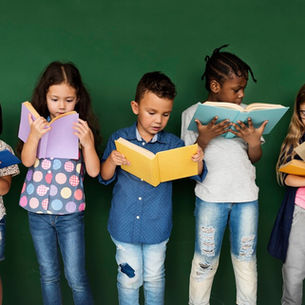Why Children’s Books with Moral Stories Are Essential for Early Development
- Rungeen Singh

- Feb 27, 2025
- 3 min read
Updated: 2 days ago
Children's books have a profound influence on impressionable minds. They are more than mere entertainments but mighty weapons for creating value and teachings about life. Among them, books with moral tales are crucial in a child's formative years. These aid in shaping character, raising emotional intelligence, and developing morality. In this blog, we are going to discuss why children's books with moral tales are important and how they help in a child's development.

1. Teaching Right from Wrong
Books are the right teacher for the children. If you want to teach them the difference between right and wrong, then storybooks are the best teaching method. By reading and explaining moral stories you can teach them about right and wrong behavior. Storybooks easily teach them about responsibility, kindness, honesty, thankfulness, and respect.
2. Enhancing Emotional Intelligence
Emotional intelligence is a crucial ability to survive life. Moral books assist children in learning their emotions and other people's emotions. They learn empathy by observing how characters feel in various circumstances. For example, The Giving Tree by Shel Silverstein portrays the themes of selflessness and unconditional love very nicely.
When kids identify with characters who are feeling happy, sad, scared, or angry, they are better able to manage their own emotions in life.
3. Building Strong Character
Good storybooks play an important and sensitive role in building strong character in children. Reading moral, ethical, and good character storybooks takes inspiration, and some ethics develop in children.
4. Encouraging Critical Thinking and Problem-Solving Skills
Reading moral stories can build or encourage critical thinking and problem-solving skills in children. Which helps to develop better understanding, observation, and other circumstances. If they are reading problem-solving stories, then they learn how to solve problems in their own lives.
5. Strengthening Parent-Child Bonds
Reading moral tales together creates a powerful relationship between children and parents. Reading time is now a time of bonding as parents get to share the teachings in the tales. Opportunities for more conversation regarding ethics, values, and real-life experiences are provided by the exercise.
Children are better able to understand the morals of books and how they relate to real-world situations when parents actively read books to them and have conversations with them.
6. Boosting Imagination and Creativity
Children's books with moral tales tend to have creative worlds and individualistic characters that make young readers very interested. The elements not only engage but also inspire creativity. As kids develop various scenarios and possibilities, they improve their creativity thinking abilities.
For instance, novels such as Alice in Wonderland and Peter Pan take children to fantasy worlds while imparting lessons on courage, curiosity, and friendship.
7. Preparing Children for Real-Life Situations
Moral tales present children with examples of real-life situations they will likely experience. They teach invaluable lessons about cooperation, equity, and conquering challenges. Children can consider the lessons learned from these stories and make wise choices if they come across similar circumstances in their real lives.
those about cooperation and sharing, for instance, help kids get along with their classmates at school, while those about endurance inspire them to keep going when things get difficult.
8. Encouraging a Lifelong Love for Reading
Young children who are exposed to books with a lot of instructional content develop a love of reading. Youngsters who enjoy stories are also more likely to develop lifelong reading habits that will help them in their academic and personal endeavours.
In addition to enhancing literacy, a love of reading promotes curiosity, lifelong learning, and personal development.
Conclusion
Morally instructive children's books are more than just tales; they are beacons of wisdom that mold young minds. They support children's character, morals, emotional intelligence, and life skills development. Parents and educators must make a concerted effort to include these novels in their reading lists if they want children to grow up with strong morals and a clear sense of right and wrong.
We create the foundation for a more optimistic and caring future by instilling these vital abilities in children at a young age. Without a doubt, one of the best ways to develop well-rounded, thoughtful, and compassionate individuals is to invest in books that convey moral stories.



























